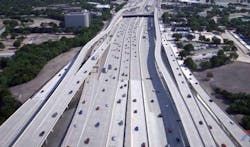New report identifies nine wasteful highway projects across U.S.
A new report by the U.S. PIRG Education Fund and Frontier Group identifies nine wasteful highway expansion projects across the country, slated collectively to cost at least $30 billion.
The report details how most highway expansions fail to solve congestion, saddle states with crippling debt, and take money away from more pressing transportation needs, including road, bridge and public transit repairs. Tax dollars allocated for transportation projects are scarce across the country, yet federal, state, and local governments spent $27.2 billion expanding highways in 2012, even as the transportation system had about a $500 billion backlog of road and bridge repair needs, and a $90 billion backlog of transit repair needs.
One of the projects included in the report is the expansion of I-94 outside of Milwaukee. That project is projected to cost Wisconsin anywhere from $1.7 to $1.9 billion, while more than 70% of the state’s existing roads are in poor or mediocre condition, tied for second-worst in the country. While the I-94 expansion moves forward, those repair needs go unmet.
“From 2008 to 2015, state highway debt more than doubled to $217 billion,” said Gideon Weissman, a Frontier Group analyst and report co-author, in a release. “We keep building new highways we don't need, and that hurts our ability to move toward a smart 21st-century transportation system that works for all of us.”
Including I-94 in Wisconsin, the report names nine road expansion projects as this year’s worst “highway boondoggles.” Among the most costly are:
- “Traffic Relief Plan,” Maryland; $9 billion—A plan to spend $9 billion on new highways comes as Maryland struggles to fix the Baltimore Metro, which was forced to close for urgent repairs in February 2018;
- U.S. Highway 101 Expansion, San Mateo, Calif.; $534 million—Widening U.S. Highway 101 in the San Mateo area will bring more cars into an already congested area, while directly conflicting with California’s climate change mitigation goals; and
- I-35 Expansion, Austin, Texas; $8.1 billion—Despite enormous state highway debt, and the growing need for transit and street improvements to create more compact and connected neighborhoods, policymakers have proposed spending $8 billion to expand I-35 through the middle of Austin.
The report recommends that states reexamine proposed highway expansion projects in light of changing transportation needs and instead invest in more effective solutions, such as road repair and transit expansion, that reduce the pursuit of costly and disruptive highway expansion projects.
---------
Source: U.S. PIRG
